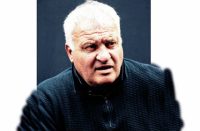 A new contender has emerged for the shortest international career on record, one whose claims had been lost amid the substitution whirligig.
A new contender has emerged for the shortest international career on record, one whose claims had been lost amid the substitution whirligig.
Wales scrum-half Clive Shell, France centre Mathieu Dourthe and Ireland‘s converted Kiwi Sean McCahill are widely accredited with the briefest Test match span, theirs having come and gone in two minutes.
Given the density of the traffic swirling around substitute benches all over the world, it is hardly surprising to discover that someone has slipped under the radar.
With due respect to the man himself, Alexandre Albouy could easily have been missed. Those who were there at the Stade de France for the opening round of the 2002 Six Nations against Italy could have been excused for missing the new scrum-half, let alone remembering him.
Albouy, then at Castres, had been summoned at short notice after Fabien Galthie failed a fitness test. His understudy, the uncapped Frederic Michalak, stepped up for his debut and Albuoy filled the gap on the bench.
He appeared in the 81st minute and nobody can be sure whether that gave him 30 seconds, one minute or two. Anything less than 90 seconds would put him ahead of Aberavon‘s Shell, Gareth Edwards’s faithful understudy whose meagre reward amounted to two minutes, at the very most, at the end of a one-sided home win over the Wallabies 40 years ago.
The fact of the matter is that once Albuoy had gone, he had gone for good as far as national affairs were concerned. The same, alas, has to be said of Shell who died last year at the age of 64.
International careers measured in mere minutes have been piling up since the advent of substitutes, or replacements to give them their official name when introduced during the late Sixties. There have been so many instances that the latest player to taste glory for less than 10 minutes has had to go some to make the top dozen of the briefest international careers.
Olly Kohn, the first international player to be discovered on Twitter, managed seven minutes for Wales at the start of their Six Nations defence, against Ireland in Cardiff last February. The Welsh management knew nothing of his ancestral claim until someone tweeted that his maternal grandfather came from Fleur de Lys in the Rhymney Valley.
At a time when Wales had been hit by an epidemic of crocked locks, it came as manna from heaven. That Kohn wound up in the top ten known shortest careers was due to a mishap in training the day before he was due to leave for Paris and the match against France.
“My bags went to Paris,” he said. “Unfortunately, I didn’t go with them. I tore a hamstring during the team run the day before the match just a few hours before we were due to fly out.
“If it hadn’t been for that, I’d have been on the bench against France. Instead I was out for eight weeks and by the time I was playing again, the Six Nations was over.
‘It was a wonderful experience, something which at that stage of my career, I never thought would be possible. I was incredibly lucky but gutted not to have been more involved. I just wish I’d had a real good chance to prove myself.’
Sentiment being in very short supply at international level, Wales could scarcely justify taking a 30-something second row to Japan, although, ironically, a few old heads might have spared them the indignity of losing the two-match series on points difference.
As it turned out, Kohn ended the season in no fit state to go anywhere. A shoulder operation after Quins’ last match, the semi-final play-off against Leicester in May, turned out to be more serious than routine surgery.
“As soon as I’d had the operation, that was it. The specialist said I should retire on medical grounds.”
The law that decreed the referee to be the sole arbiter of time meant that the duration of international matches tended to vary down the decades. How much or how little injury time was down to the man in the middle until it dawned on the authorities that he had enough on his plate without doubling up as a chronometer.
Synchronised clocks, a comparatively recent innovation, have made timing a less inexact science, although there is an extensive gap between total playing time and that recorded by the game clock which is stopped on the referee’s say-so for a variety of reasons, not just injuries.






















